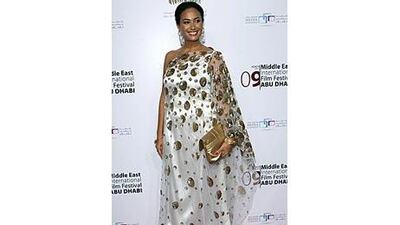NEW YORK // The Tunisian actress Hend Sabry, who has made some of the most forceful films in modern Arab cinema, will address a high-level aid meeting in Dubai today in her new role as a celebrity ambassador for the United Nations' World Food Programme.
After a string of forthright movies about women's rights, extremism and sexual repression, Sabry, 31, will highlight the plight of impoverished Palestinians, Yemenis and Iraqis during her keynote speech at the Dubai International Humanitarian Aid and Development Conference and Exhibition (Dihad). Sabry, who starred in the big-budget Arabic thriller The Yacoubian Building, will unveil plans to visit Yemen this month and urge Dihad delegates from the Gulf to help their cash-strapped neighbour.
"The Arab media doesn't give too much attention to what is happening in Yemen, and what is happening there is a disaster," she said in an interview. "The Yemeni people are suffering. There is drought, not enough food and water shortages. "We want to try to mobilise the Gulf wealth. They are doing a lot, and Dihad is a very good opportunity to show how much the wealthy Gulf companies and families are doing for charity in the Arab world. But Yemen is the forgotten cause."
The UN appointed Sabry as an "ambassador against hunger" in January. The actress already had a history of working with the World Food Programme (WFP) after visiting Iraqi refugees in Syria and making a controversial trip to the West Bank last year. Colleagues from Egypt's arts scene criticised Sabry for visiting the Palestinian territory in November, part of a long-running debate among Arab intellectuals over whether such trips "normalise" ties with Israel. "There was a whole polemic about Arabs going to the West Bank and whether it is normalisation or not," said Sabry.
"I said, 'I don't care.' It was not a political visit, it was a humanitarian one. All my visits in the future will be humanitarian. "I don't have the tools to talk about politics. I'm not interested in politics. I'm interested in kids suffering and going to bed hungry, whether they're from Afghanistan, Palestine, Haiti or anywhere else in the world." Sabry joined her fellow actor and UN ambassador Mahmoud Yassin in January to launch the Arab appeal to help the victims of Haiti's devastating earthquake.
The star, who promoted Arab designers by wearing locally produced gowns on the red carpet of the Middle East International Film Festival in Abu Dhabi last year, said she wanted Arab philanthropists to extend aid-giving beyond the region's borders. "I don't like this feeling that my heart should be aching more for an Arab child than a Haitian child. A child is a child, and a suffering child is a suffering child," she said.
"It was always something I found very bizarre. When there was a huge natural disaster like Haiti or the tsunami, I felt that the Arab region didn't really feel damage in other parts of the world. Now, Arab youth is starting to get more involved in what's happening on the other side of the world." Sabry won the Rotterdam Arab Film Festival award for best actress for the 2008 film The Aquarium, in which she played a late-night radio talk show host taking calls about the secret sexual and political lives of Cairo residents.
She will begin filming the latest of her challenging films, Asmaa, later this year, dealing with the prejudice endured by an HIV-infected woman in an Arab society that has not yet, she said, come to terms with the scale of a growing Aids threat. The actress, who recently began writing columns for the liberal Egyptian daily Al Masry Al Yom, praised the work of the WFP, whose 10,000 staff aim to feed more than 90 million people in 73 countries this year.
After her visits to Middle Eastern trouble spots where the WFP was working last year, Sabry's recommendation for providing food handouts to Iraqis and Palestinians is simple - treat recipients with respect. She lauds the food coupon schemes that allow Palestinians to buy milk, bread and other staples in regular supermarkets, and the importance of ensuring that Iraqi refugees are able to maintain self-esteem despite hardship.
"We always confuse hunger with poverty," she said. "We think the people who live with less than two or three dollars a day are considered poor. It was very painful to see educated people depending on an international organisation to survive. So preserving personal dignity is the issue I want to convey to the audience in Dubai." jreinl@thenational.ae


